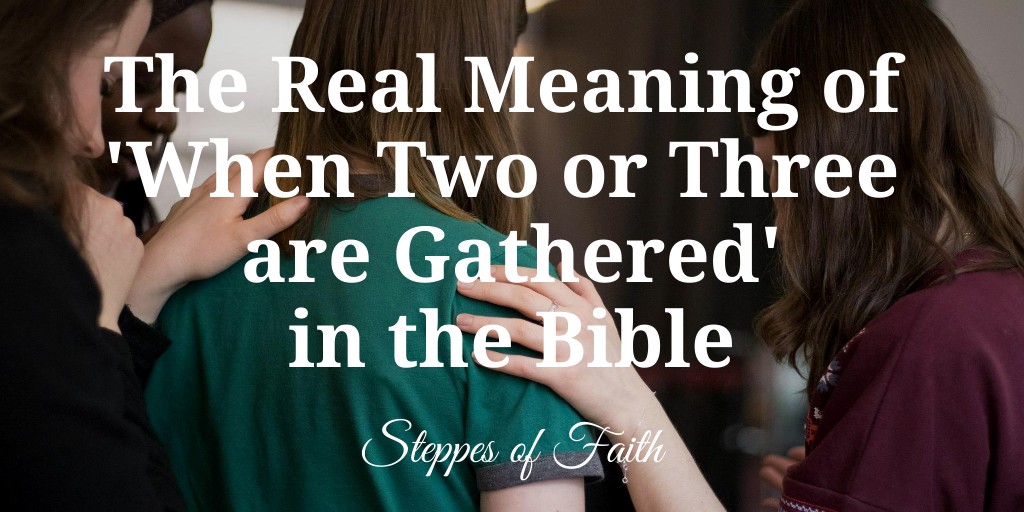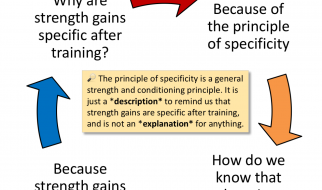 http://www.steppesoffaith.com/apologetics/meaning-two-or-three-gathered-bible
http://www.steppesoffaith.com/apologetics/meaning-two-or-three-gathered-bible
?I am there in the midst of them.? Matthew 18:20
It?s a common Bible verse that you?ve probably heard or even said many times ? ?When two or three are gathered together in My name, I am there in the midst of them.? We find it in Matthew 18:20, and we (including me) often use this verse when we want to agree with someone in prayer.
I?m afraid to break the news to you, but that?s not what this verse is about at all!
So, what was Jesus talking about if it wasn?t about prayer? Jesus often talked about Jewish laws and cultural norms of the time and put an extra spin on them that better reflects the kingdom of God. In Matthew 18, He?s doing it again. Here, He?s referring to an important part of Old Testament law, the part about church discipline.
How to Handle Unruly Church Members
Beginning in Matthew 18:15, Jesus is explaining to the people how to handle church discipline.
?Moreover, if your brother sins against you, go and tell him his fault between you and him alone. If he hears you, you have gained your brother. But if he will not hear, take with you one or two more that by the mouth of two or three witnesses, every word may be established. And if he refuses to hear them, tell it to the church. But if he refuses even to hear the church, let him be to you like a heathen and a tax collector.?
Jesus is explaining that if you have an issue with someone in the church?
- Talk to him (or her) privately about it.
- If he refuses to repent, grab two or three friends ? people you trust ? who will back you up when you talk to him a second time.
- If he still refuses to say sorry, take your friends with you and speak to the church about the issue.
- If the church confronts him and he still refuses to apologize or make things right, then you have permission to have a bad opinion of him and never to have anything to do with him again. In other words, you can symbolically kick him out of the church.

Notice that Jesus gives the offender four chances to make amends. That?s far more opportunities than most of us would give. But this is the protocol you follow when you have a problem with someone in the church.
Solving disputes within the church is an important part of Jesus? ministry. His church must be able to work together harmoniously or else the Good News gets lost, and we become unable to share it with others.
Gathering Two or Three
Jesus? words in Matthew 18:20 reflect what every Jewish man (and many women) knows from the Torah, specifically the book of Deuteronomy which talks about disputes within the church. Since all Jewish men were required to memorize the Torah (that?s the first five books of the Old Testament, and yes, all of it), they would have instantly understood what Jesus was referring to.
?Whoever is deserving of death shall be put to death on the testimony of two or three witnesses; he shall not be put to death on the testimony of one witness.? Deuteronomy 17:6
?One witness shall not rise against a man concerning any iniquity or any sin that he commits; by the mouth of two or three witnesses, the matter shall be established.? Deuteronomy 19:15
How to convict someone of wrongdoing is a standard of practice they are all very familiar with ? you should have two or three people with you to testify on your behalf. They don?t necessarily have to be a witness to the crime, just a witness to your integrity.
The difference, in this case, is Jesus isn?t talking about bringing the offender before earthly church leaders to argue your case. His emphasis is more on the spiritual aspect of it.
In the book of Matthew, Jesus amends the Jewish law to remind us that He will be there with them through the process.
??I am there in the midst of them.?
The ESV Study Bible says,
?Jesus affirms that he will be divinely present among his disciples as they seek unity in rendering decisions, which is rightly understood also as an affirmation of omnipresence and therefore of deity. ?
What this all means is not only is Jesus with you as you deal with the wrongdoer, He also becomes a witness to your integrity and purity of heart.

Restore, Reconcile, and Forgive
It?s important to notice how Matthew 18:20 fits into the theme of the entire chapter. The process of church discipline comes immediately after he tells the parable of the lost sheep (Matthew 18:12?14) and before the parable of the master who forgave his unrepentant servant for being unable to pay his debts (Matthew 18:22?35).
Jesus is instructing the people about restoring someone who has gone astray (a lost sheep), assigning justice to the matter, forgiveness (as the master did for his unrepentant servant), and reconciliation. God assures us that as we go through the process of bringing our brother or sister in Christ back into the fold of the church, God will be a part of it and bless us for it.
Dr. Eric Bargerhuff, pastor and author of The Most Misused Verses in the Bible, puts it this way:
?Jesus is saying that whenever the church is pursuing and is involved in a reconciliation process with someone who has refused to repent, they can rest assured that God?s blessing is with them in their efforts. In other words, as the church renders the judicial decisions on matters of right and wrong that are based on the truth of God?s Word, they should be confident that they are doing the right thing and that Christ himself is right there with them, spiritually present in their midst.?
It?s Not About the Math
I love how right in the middle of Jesus explaining this whole idea of restoration and forgiveness Peter suddenly speaks up and says, ?Lord, how often shall my brother sin against me, and I forgive him? Up to seven times??
It?s like Peter is saying, ?Wait, what? Hey, Jesus, can You repeat that? I have to forgive how often? Well?I can forgive up to seven times. That?s pretty good, don?t You think??
Now, you have to remember that, in the Jewish culture, to forgive someone seven times would be extraordinary. That would require an amazing amount of forgiveness as far they?re concerned. But Jesus lovingly looks at Peter and says, ?I do not say to you up to seven times, but up to seventy times seven.?

Jesus doesn?t intend to throw out a math problem here. The answer doesn?t matter. What Jesus is saying is that we are to love as He loves and forgives as He forgives. How many times does God forgive our sins? Lamentations 3:22?23 tells us His mercy is new every morning, and His faithfulness never fails, which means He?s willing to forgive us every single day.
So, ask yourself?how many times has He forgiven you? Probably more than seventy times seven if you?re anything like me. If He has forgiven us that much, then how often should we forgive the people around us who push our buttons, outright offend us, or just plain annoy us?
You can do the math if you like, but Jesus? point is to forgive and keep forgiving for as long as it takes until the offender is restored to Him.
But, if they are unrepentant, grab your spouse or a friend or two and settle the matter as quickly as possible knowing God?s presence will be among you, and His blessing goes with you.
What About When We Pray?
Many of us thought Matthew 18:20 was talking about God?s presence when we pray, so what does it mean for our prayer life? Does God still hear us when we pray, or do we need a prayer partner? Does it count at all if we pray alone?
We need to be clear?God always hears us when we pray. Whether you?re sitting alone in the car, on your knees next to your bed, or joining your congregation at church, God always hears us. The Bible confirms this fact multiple times

?For the eyes of the Lord are on the righteous, and His ears are attentive to their prayer, but the face of the Lord is against those who do evil.? 1 Peter 3:12
?And if we know that He hears us ? whatever we ask ? we know that we have what we asked of Him.? 1 John 5:15
?Then you will call on Me and come and pray to Me, and I will listen to you. You will seek Me and find Me when you seek Me with all your heart.? Jeremiah 29:12?13
?I cried out to Him with my mouth; His praise was on my tongue. If I had cherished sin in my heart, the Lord would not have listened; but God has surely listened and has heard my prayer. Praise be to God, who has not rejected my prayer or withheld His love from me!? Psalm 66:17?20
God?s love and faithfulness are eternal, and His mercy is new every day. Let us love as He loves, forgives as He forgives, seek justice and love mercy, and enjoy His many blessings when we handle things the Lord?s way. His way is always the best way.
And, if you can take two or three friends with you along the way, all the better.

